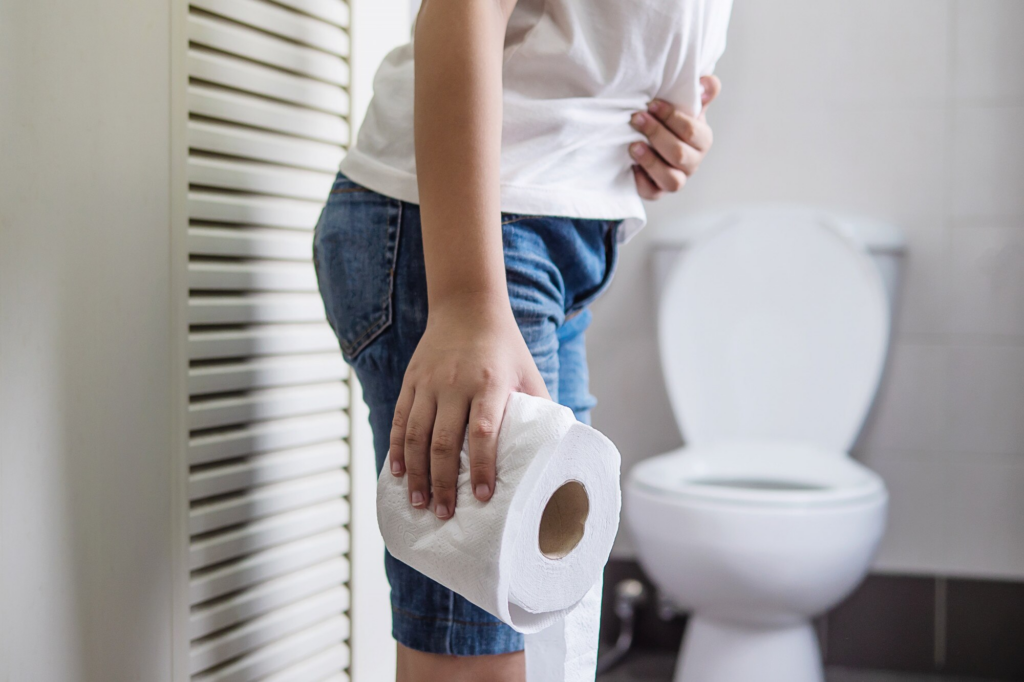Constipation is often dismissed as a temporary nuisance, something that a fiber-rich meal or a glass of water can fix. But what if it lingers for weeks? What if it becomes a chronic issue that wreaks havoc on your digestive system? Chronic constipation is more than just discomfort—it can lead to severe, even life-threatening health complications if ignored.
Many people underestimate its dangers, but a shocking real-life case shows why addressing chronic constipation is crucial for overall well-being.

A Startling Case: When Constipation Becomes a Medical Emergency
A young woman suffering from years of chronic constipation experienced a severe health crisis that forced her to seek medical attention. She had gone over two weeks without a bowel movement, and the pain became unbearable. When doctors conducted an X-ray, the results were alarming.
Her colon had stretched abnormally, expanding so much that it pressed against her chest. The natural folds and wrinkles in her large intestine—vital for digestion—had been almost completely smoothed out due to the extreme bloating and stool buildup. This shocking image highlighted a dangerous condition that, if left untreated, could have resulted in serious complications.
Video: Doctor explains CONSTIPATION | Causes, symptoms & treatment – plus when to see your own doctor!
What Causes Chronic Constipation? The Hidden Culprit Behind the Blockage
Chronic constipation occurs when waste moves too slowly through the digestive tract, leading to hardened stools that become difficult to pass. But what’s really behind this sluggish movement?
1. Poor Dietary Habits
A low-fiber diet filled with processed foods, dairy, and refined carbs is one of the leading causes of constipation. Without enough fiber to bulk up stools and promote movement, waste sits in the colon for too long.
2. Dehydration
Water plays a vital role in softening stools. When the body lacks adequate hydration, stools become dry, compacted, and painful to pass.
3. Sedentary Lifestyle
Physical activity stimulates the intestines. Lack of exercise can slow down bowel movements, making constipation a frequent issue for those who sit for long periods.
4. Ignoring the Urge to Go
Many people ignore bowel urges due to busy schedules or inconvenient timing. However, delaying bowel movements can cause stool to harden, making it even harder to pass later.
5. Certain Medications
Painkillers, antidepressants, and iron supplements can contribute to constipation by slowing down digestion.
Ignoring these underlying causes can lead to severe health risks. Let’s explore the dangerous consequences of untreated chronic constipation.
The Dangerous Consequences of Chronic Constipation

1. Severe Colon Distension
When the colon stretches beyond its normal capacity due to stool buildup, it loses its ability to contract effectively. This makes constipation even worse, creating a vicious cycle where waste continues to accumulate, leading to extreme bloating and discomfort.
2. Toxin Build-Up in the Body
The longer waste stays in the colon, the more bacteria and toxins are reabsorbed into the bloodstream. This can lead to:
- Chronic fatigue
- Acne and skin problems
- Weakened immune system
- Foul breath and body odor
Toxins that should be eliminated end up circulating in the body, causing systemic health issues.
3. Hemorrhoids and Anal Fissures
Straining to pass hard stools puts excessive pressure on the rectal veins, leading to swollen, painful hemorrhoids. In severe cases, tiny tears (anal fissures) develop in the anus, making each bowel movement agonizing.
4. Intestinal Blockage (Bowel Obstruction)
One of the most serious complications of untreated constipation is a complete bowel obstruction. When waste completely blocks the intestine, it can cut off blood supply, leading to:
- Tissue death (necrosis)
- Severe infections
- Intestinal rupture
In extreme cases, emergency surgery is required to remove damaged sections of the intestine.
5. Increased Risk of Colon Cancer
Studies suggest that chronic constipation may increase the risk of colorectal cancer. When stool remains in the colon for too long, prolonged exposure to harmful toxins can trigger abnormal cell growth and inflammation.
With these risks in mind, preventing and treating constipation should be a top priority for maintaining digestive health.
How to Prevent and Treat Constipation Naturally

The good news? Chronic constipation can often be managed and even prevented with simple lifestyle changes.
1. Increase Fiber Intake
Fiber adds bulk to stools and helps them move smoothly through the intestines. Foods rich in fiber include:
- Whole grains (oats, brown rice, quinoa)
- Nuts and seeds (chia seeds, flaxseeds, almonds)
- Fruits (apples, pears, prunes)
- Vegetables (broccoli, spinach, carrots)
2. Stay Hydrated
Water is essential for digestion and stool softening. Aim for at least 8–12 cups of water per day. Drinking warm lemon water in the morning can also stimulate digestion.
3. Exercise Regularly
Physical movement encourages bowel activity. Simple activities like:
- Walking for 30 minutes a day
- Yoga and stretching
- Light jogging or cycling
can significantly improve digestion and prevent constipation.
4. Establish a Bathroom Routine
Train your body to have regular bowel movements by:
- Going at the same time every day (preferably after meals)
- Never ignoring the urge to go
- Creating a calm, unhurried bathroom environment
5. Limit Processed and Low-Fiber Foods
Reduce foods that slow down digestion, including:
- Red meat
- Fried and greasy foods
- White bread, pastries, and refined sugars
- Dairy products (for those who are sensitive)
6. Try Natural Remedies
- Herbal teas like ginger, peppermint, and fennel can aid digestion.
- Magnesium supplements help relax the intestines, making stool easier to pass.
- Aloe vera juice acts as a natural laxative and soothes the digestive tract.
When to Seek Medical Help
Video: Constipation Foods You MUST AVOID! 3 Simple Steps to Overcome Chronic Constipation
While occasional constipation is normal, chronic constipation that lasts for weeks should never be ignored. Seek medical attention if you experience:
- Severe bloating and abdominal pain
- Vomiting or nausea
- Blood in your stool
- Unexplained weight loss
- A complete inability to pass stool
Early intervention can prevent life-threatening complications.
Conclusion: Take Control of Your Digestive Health
Chronic constipation is more than just an inconvenience—it’s a warning sign that your digestive system needs attention. Ignoring it can lead to dangerous complications, from colon distension to life-threatening bowel obstructions.
By making small daily changes—eating fiber-rich foods, staying hydrated, exercising, and listening to your body—you can support your digestive system and prevent long-term health problems.
Your gut health directly impacts your overall well-being, so don’t ignore the signs. Take action today and ensure that chronic constipation doesn’t silently damage your health


